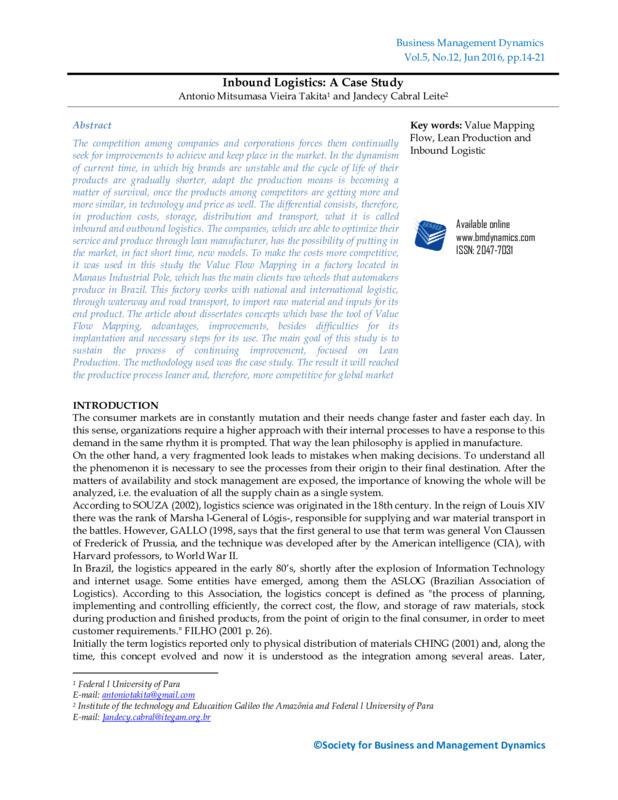-
Tipo do ITEM
-
Artigo Ciêntifico
-
Título do Artigo
-
Inbound Logistics: A Case Study
-
Descrição
-
The consumer markets are in constantly mutation and their needs change faster and faster each day. In this sense, organizations require a higher approach with their internal processes to have a response to this demand in the same rhythm it is prompted. That way the lean philosophy is applied in manufacture. On the other hand, a very fragmented look leads to mistakes when making decisions. To understand all the phenomenon it is necessary to see the processes from their origin to their final destination. After the matters of availability and stock management are exposed, the importance of knowing the whole will be analyzed, i.e. the evaluation of all the supply chain as a single system.
According to SOUZA (2002), logistics science was originated in the 18th century. In the reign of Louis XIV there was the rank of Marsha l-General of Lo?gis-, responsible for supplying and war material transport in the battles. However, GALLO (1998, says that the first general to use that term was general Von Claussen of Frederick of Prussia, and the technique was developed after by the American intelligence (CIA), with Harvard professors, to World War II.
In Brazil, the logistics appeared in the early 80’s, shortly after the explosion of Information Technology and internet usage. Some entities have emerged, among them the ASLOG (Brazilian Association of Logistics). According to this Association, the logistics concept is defined as "the process of planning, implementing and controlling efficiently, the correct cost, the flow, and storage of raw materials, stock during production and finished products, from the point of origin to the final consumer, in order to meet customer requirements." FILHO (2001 p. 26).
Initially the term logistics reported only to physical distribution of materials CHING (2001) and, along the time, this concept evolved and now it is understood as the integration among several areas. Later,
-
Abstract
-
The consumer markets are in constantly mutation and their needs change faster and faster each day. In this sense, organizations require a higher approach with their internal processes to have a response to this demand in the same rhythm it is prompted. That way the lean philosophy is applied in manufacture. On the other hand, a very fragmented look leads to mistakes when making decisions. To understand all the phenomenon it is necessary to see the processes from their origin to their final destination. After the matters of availability and stock management are exposed, the importance of knowing the whole will be analyzed, i.e. the evaluation of all the supply chain as a single system.
According to SOUZA (2002), logistics science was originated in the 18th century. In the reign of Louis XIV there was the rank of Marsha l-General of Lo?gis-, responsible for supplying and war material transport in the battles. However, GALLO (1998, says that the first general to use that term was general Von Claussen of Frederick of Prussia, and the technique was developed after by the American intelligence (CIA), with Harvard professors, to World War II.
In Brazil, the logistics appeared in the early 80’s, shortly after the explosion of Information Technology and internet usage. Some entities have emerged, among them the ASLOG (Brazilian Association of Logistics). According to this Association, the logistics concept is defined as "the process of planning, implementing and controlling efficiently, the correct cost, the flow, and storage of raw materials, stock during production and finished products, from the point of origin to the final consumer, in order to meet customer requirements." FILHO (2001 p. 26).
Initially the term logistics reported only to physical distribution of materials CHING (2001) and, along the time, this concept evolved and now it is understood as the integration among several areas. Later,
-
Língua do arquivo
-
inglês
-
Data da Publicação
-
Ano Desconhecido
-
Autores
-
Antonio Mitsumasa Vieira Takita and Jandecy Cabral Leite
-
Local
-
UFPA - Manaus/2016


